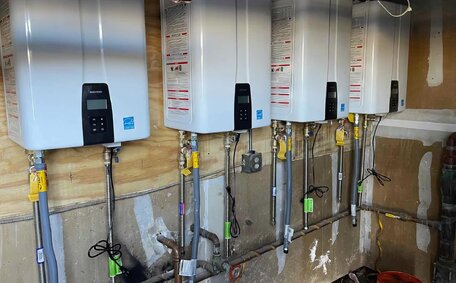The Risks of Using Bleach on Clogged Drains
Using bleach to unclog your drain involves significant risks that you should consider.
Mixing bleach with other household cleaners in your pipes can trigger harmful chemical reactions, leading to toxic gases like chlorine, which poses a risk to lung health in high concentrations.
Bleach can also deteriorate pipes, potentially causing leaks or ruptures, and disrupt sewage treatment by destroying the beneficial bacteria essential for decomposing waste.
Rather than bleach, consider safer methods such as a drain snake for obstruction removal, or a concoction of baking soda and vinegar for a risk-free clean. If confronted with a severe clog, enlisting a professional plumber ensures a safe and efficient resolution without harming your plumbing system.
Bleach’s Effectiveness on Different Clog Materials
While bleach is adept at dissolving organic obstructive materials like hair and food remnants, it falls short when faced with inorganic blockages such as grease or minerals, due to its incompatibility with such substances.
Grease clogs in particular are unlikely to be affected by any amount of bleach alone. The grease solidifies and sticks to the sides of pipes, resisting the bleaching action. Small or partial clogs made up of varied materials may break up somewhat, but bleach works best on organic clogs.
It’s important to identify the likely source of any clog there before deciding if bleach is an appropriate unclogging agent.
When Bleach Can Damage Pipes
Avoid using liquid bleach for cleaning pipes made of softer metals such as aluminium, copper, or galvanised steel due to its corrosive properties, which can cause deterioration over time and damage beneficial bacteria in septic systems.
The high concentration of chlorine in bleach is designed to break down organic matter, but it will also eat away at the above pipe materials.
After repeated bleach exposure, pinhole leaks or even bursts can occur due to pipe erosion. Your septic tank relies on healthy colonies of bacteria to help process waste. Indeed, bleach can harm your septic system by killing essential bacteria when it mixes with drain contents.
Before choosing bleach as a drain cleaner, verify the material of your pipes and type of sewer system. In older homes with septic systems or softer metal plumbing, the long-term damage bleach may cause outweighs any temporary benefit of clearing minor blockages.
Safe Alternatives to Using Bleach
There are several safe and effective alternatives for unclogging drains without the need for harsh chemicals like bleach.
Prevention
Preventative measures are key: flush your kitchen sink with water after each use to help disperse leftover residues and prevent clogs.
Maintain a clear shower drain to avert blockages—install drain covers to catch hair and other debris, and avoid pouring fats or oils down the kitchen sink.
Boiling Water and Dish Soap
Alternatively, for minor clogs from organic debris, a less frequent use of hot water and dish soap may be suitable. The heat can assist the drain in dissolving soap scum and grease while the soap emulsifies the grime.
Let the solution work for 10-15 minutes before flushing the drain with more hot water to ensure proper clearance.
Baking Soda and Vinegar
Alternatively, create a solution of 1⁄2 cup baking soda and 1⁄2 cup white vinegar, allow it to foam, and then pour it into the drain. The chemical reaction helps dissolve hair soap scum and small obstructions.
Cover and Leave it for 30 minutes to an hour before rinsing with hot water.
Drain Snake
Using a drain snake to physically remove clogs bypasses the need for any chemical drain cleaner. Feed the hooked snake end down the pipes and manually pull out hair, grease and debris trapping water.
Call a Professional
For stubborn or repeat clogs, either gear up with rubber gloves or engage a licenced plumber, who can deploy commercial-grade cleaning solutions and pressurised water jets to thoroughly eliminate blockages without pipe damage.
Manual Drain Unclogging Methods
Unclogging drains manually using common household items is an effective, environmentally friendly method. Follow these straightforward techniques for clearing minor blockages yourself:
Plunger
To effectively suction out blockages, create a seal with a wet cloth over the drain and pump the plunger vigorously for 10-15 strokes, repeating if needed.
Slowly feed a flexible drain snake down the pipes. Crank the handle once hitting an obstruction to hook and extract hair, grease and debris. Advance farther to fully clear the clog.
Commence with a pour of 1⁄2 cup of baking soda, followed by an equal measure of vinegar down the drain.
To unclog shower blockages or severe recurring clogs in other fixtures, call a professional plumber to properly diagnose the issue and employ commercial strength drain cleaning methods as needed.
Homemade Drain Cleaner Recipes
Homemade drain cleaners can dissolve hair, soap scum and other gunk clogging your drains without harming pipes or the environment. Here are safe, effective recipes to try using common household ingredients:
Baking Soda and Vinegar Volcano
Combine equal parts of baking soda and white vinegar in a heat-resistant container. Pour this mixture into the drain and cover with a plate to manage the effervescent reaction, which will help disintegrate any buildup.
Boiling Water and Soap
The boiling water’s heat dissolves grease, and the soap assists in scrubbing away buildup.
Pour the boiling water down the drain, followed immediately by a squirt of dish soap. Let it work for 15 minutes before flushing with more boiling water.
Citrus Peels and Borax
Blend the peels from three citrus fruits with a cup of borax to form a paste. Introduce this mixture into the drain and allow it to work through the night before rinsing.
Rinse in the morning.
Use these homemade recipes first for minor clogs. Call a professional plumber for serious blockages or pipe damage.
Tips for Preventing Future Clogs
There are several easy ways to help prevent clogs from occurring in the first place:
Use Drain Covers
Install drain covers or screens over all sink and tub drains to catch hair, food, and other debris before it goes down the pipes.
Limit Grease in Drains
To prevent clogs, never pour fats, oils, or grease down the sink; instead, wait until they solidify and dispose of them in the bin.
Regular Maintenance
Maintain your drains regularly with a monthly cleanse of 1⁄2 cup baking soda, then 1⁄2 cup vinegar in each drain. Allow the bubbling interaction to act for 5-10 minutes before rinsing with hot water.
Avoid Harsh Chemicals
Avoid commercial drain cleaners to prevent damage to pipes. Use natural homemade cleaners instead, like boiling water mixed with dish soap.
If you’re faced with recurring clogs or severe blockages, consult a licenced plumber, who can accurately identify the problem and employ safe, commercial-grade techniques if necessary.
Simple preventative measures can significantly reduce the occurrence of clogs and maintain smooth-flowing drains over time.
When to Call a Professional Plumber
As a plumbing company operating in the Sydney area for over 15 years, we at Colyton Plumbing understand there are times when a drain issue calls for professional assistance.
Signs You Need a Pro
Contact us promptly if you experience any of the following issues:
- Backed up sewer lines resulting in sewage backups into your home
- Slow-draining your bathroom sinks, tubs, or a clogged shower despite several days of attempts at home remedies
- Strong sewer gas smells coming from drains
- Overflowing toilet bowls not resolving with toilet unclogging methods such as plunging
- Gurgling drains accompanied by foul odours
- Multiple clogged drains or standing water throughout your home
Our Services
Our licenced plumbers are equipped with high-powered tools and expertise to address issues including:
- Main sewer line clogs
- Tree root invasions
- Grease, soap buildup removal
- Pipe inspections with sewer cameras
- Hydrojet drain cleaning
- Toilet repairs and replacement
Additionally, our maintenance services can prevent clogs and keep your drains functioning optimally.
Contact Us Today
Don’t wait for your drains to become totally blocked. Call Colyton Plumbing now at 1300 349 338 or email jobs@colytonplumbingservices.com.au to schedule an appointment.






